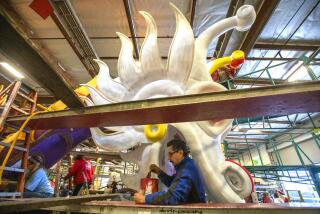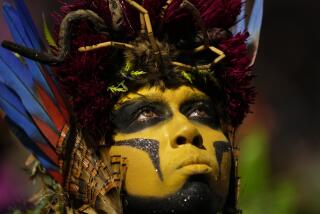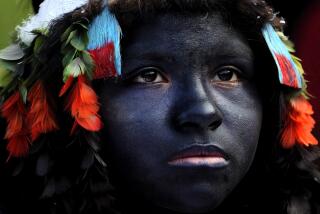Rio makes do as Carnival festivities are canceled

RIO DE JANEIRO — In a normal year, Eduardo Cerqueira das Chagas would have been stepping into Rio de Janeiro’s 90,000-seat Sambadrome stadium Friday night — clad in velvet, sequins and feathers, for the opening of Carnival.
“It’s magic,” said Das Chagas, who has participated in the Carnival parade for the past 44 years. “It’s that moment when you see what you’ve worked for all year come together.”
Instead, as COVID-19 races through Brazil and has caused cancellation of the annual event, he stood at the counter of a brightly lit boutique, selling face masks and T-shirts emblazoned with the crest of União da Ilha, the local samba school in Ilha do Governador, the far-flung neighborhood near Rio’s airport where he grew up.
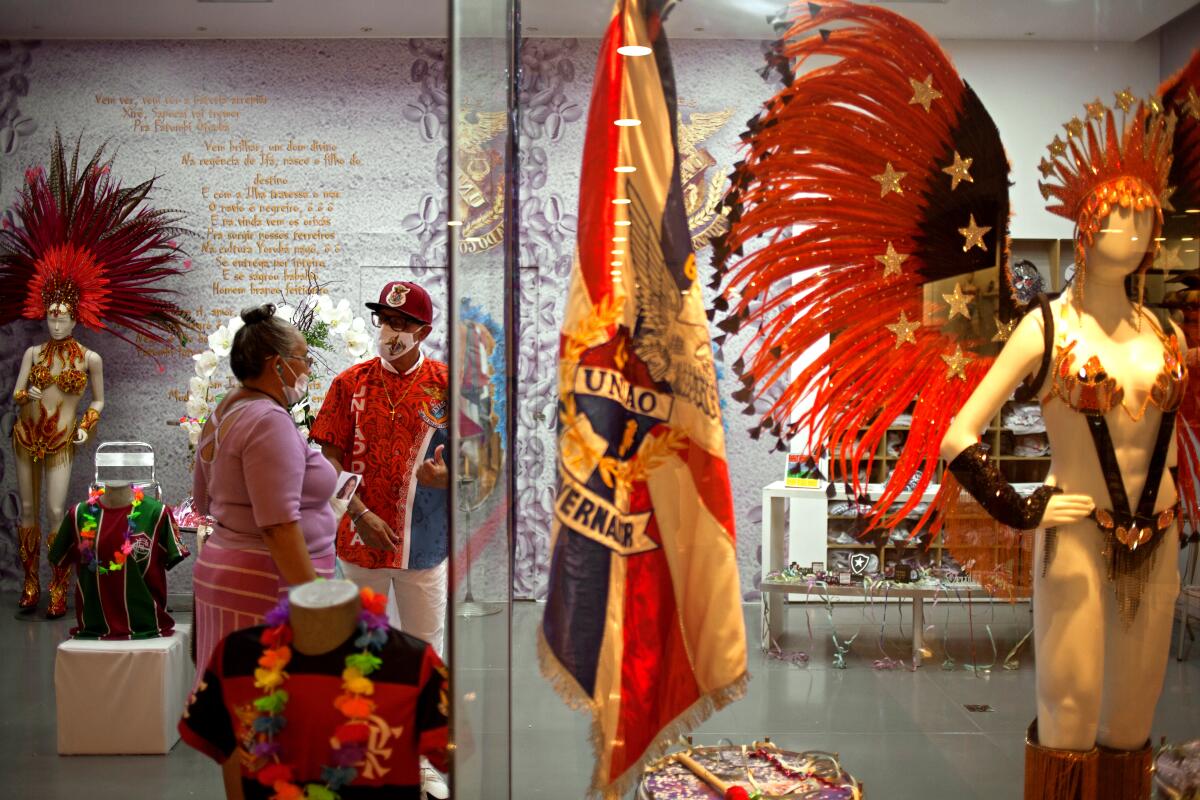
His new gig is a far cry from orchestrating the assembly of hundreds of glittering costumes for the school, as he has done in the past. “Everything had to run by me. Every bead, every pom-pom, every feather,” he proudly said.
Das Chagas bumps fists with a customer who strolls into the shop. “Do you have masks?” Das Chagas nods, pulling out a few different models. As he waited for his receipt, the man bounced his leg to the samba beat blaring from the speaker. “Have you been watching the old parades? I’ve been re-watching them since Monday,” Das Chagas laughed.
Starting March 15, people ages 16 to 64 who are disabled or at high risk for morbidity and mortality from COVID-19 will be eligible for vaccination.
For generations, even in the most turbulent of times, the five-day extravaganza has remained a rare Brazilian constant. Dancers clad in glittering costumes shimmied to samba music despite the Spanish flu, both World Wars and a military dictatorship.
“Carnival is this yearly opportunity for catharsis, for relief,” said Wagner Gonçalves, the creative art director, or carnavalesco, of Estácio de Sá, one of Rio’s oldest and most traditional samba schools. “It is this encounter with joy and with unity. The world unites in this moment, to celebrate life, to celebrate joy.”

But COVID-19 changed that. The pandemic has dealt a punishing blow to Brazil, infecting over 9.7 million people, claiming the lives of 236,000, in one of the world’s worst outbreaks. Even the arrival of vaccines has brought little relief as doses run low.
And after first postponing Carnival, officials were finally forced to cancel the tradition of parades, dancing competitions and street celebrations in which millions of people dressed in costumes and doused in glitter dance, sing, drink, kiss and embrace. While there is no lockdown in Rio, authorities have warned they will crack down on clandestine parties and events, some of which were reportedly nonetheless being held on boats in wealthier districts.
Overnight, however, the deadly virus also wiped out the livelihoods of thousands of contracted workers who labor year-round to put on the world’s largest party. Samba schools — mostly rooted in working-class and favela communities — rely on an army of seamstresses, carpenters and artisans to realize their visions. Carnival typically generates some $560 million from tourism and creates more than 70,000 jobs, authorities estimate.
Far-right President Jair Bolsonaro has lambasted the “excesses” of Carnival and, in turn, has come under sharp criticism by samba schools with political messages. He has remained silent on COVID-19’s toll on Carnival, but his government did lend a hand to vulnerable informal workers with a monthly voucher of $110 last year. That program came to an end in December and plans for more economic help remain in limbo, stymied by a ballooning public spending bill.
For Das Chagas, the cash voucher became his only lifeline.
For years, he has earned about $500 per month from his work at União’s warehouse in Samba City, a sprawling cluster of barracks where workers stitch costumes and build floats for Rio’s samba schools. “I make a living from Carnival, it’s everything to me,” he said. “All of a sudden, my income vanished.”
Then, just as the help ran out, he landed a job at the newly opened shop, an airy space decorated with lavish costumes and blown-up images of past parades. Although he earns just over half of what he used to, it keeps him afloat. “It came at the perfect moment,” he said with relief. “It pays my bills.”
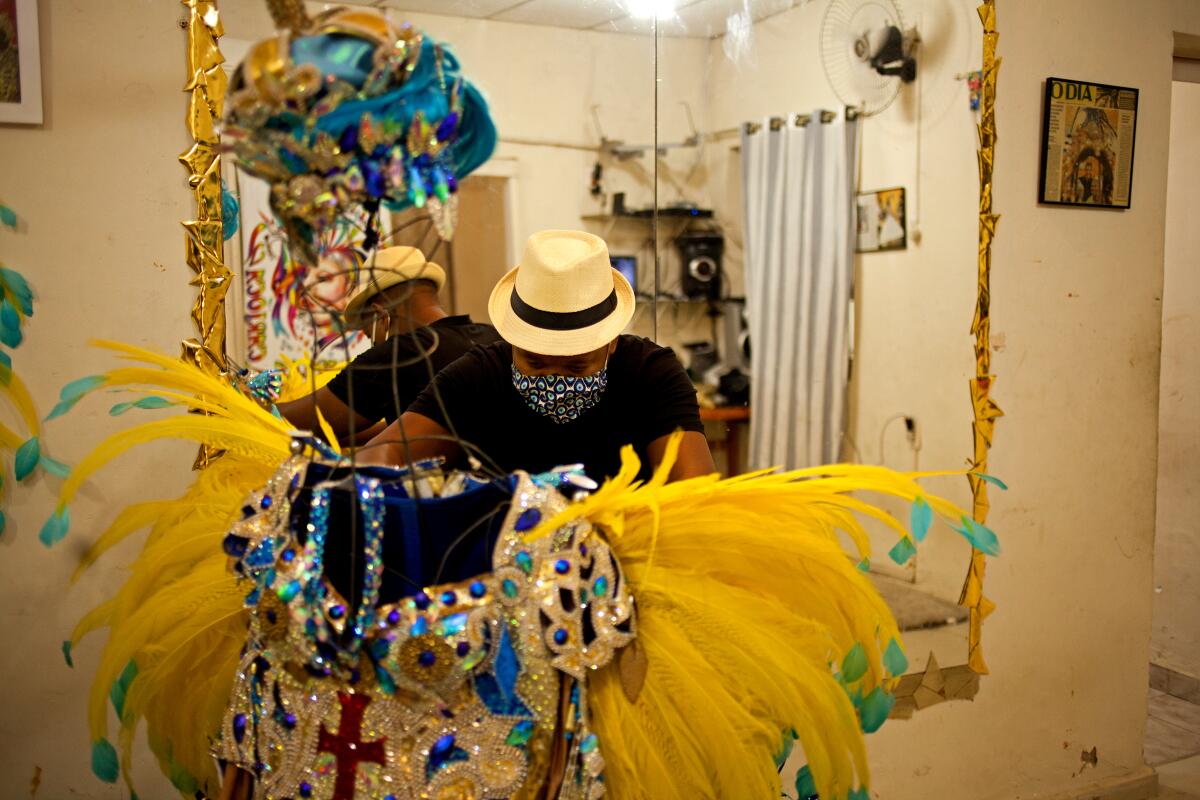
Leonardo Leonel has also had to reinvent himself. Just days before Carnival, his studio in Rio’s historic Vila Isabel neighborhood stood uncannily empty. For the past 18 years, he and his partner Leandro dos Santos have been crafting the luxurious centerpiece costumes donned by the “queens” and “muses” of samba schools. Some of Rio’s most iconic schools like Vila Isabel, Portela and Mangueira have paraded pieces created by the duo.
Normally, more than a dozen workers would be busily gluing gems on corsets and pinning feathers on skirts. Now, the fabrics and sequins they once used to create masterpieces for Carnival are being stitched onto artisan aprons and jeweled deities that Leonel and Dos Santos sell on the internet.
“We’re all trying to survive,” Leonel said as he fluffed the cobalt-blue feathered skirt of a costume from last year’s Carnival. Each costume like this, he said, takes roughly four months to make. The workshop makes an average of 30 each year.
Early in the pandemic, Leonel tried to keep his workers afloat, distributing basic food parcels to the 15 families and 50 contractors his studio employs. Finally, he had to let the majority go, keeping just two workers and a seamstress on.
“People say, ‘oh, Carnival is just for fun.’ No, it’s not just for fun. It’s our life. And we are not disposable because there’s no Carnival this year.”
Beyond the economic blow, the absence of Carnival is also leaving a void for many of Rio’s communities.
“It’s not just a parade of samba schools down the avenue,” said Manuela Oiticica, a composer who writes samba songs for schools like Mangueira and Portela. “It is much, much more — it’s a community, a family, a social network.”
For Gonçalves, it feels like a loss. “I never imagined life without Carnival. I feel this immense emptiness.”
Catinha Coelho also feels Carnival’s absence this year. “It was a shock. We’ve never known a world without Carnival.”
Coelho started the Batuke de Batom — or the Lipstick Battery — bloco nine years ago, hoping to create more space for female percussionists. Each year, the bloco gathers in a wide public square in Ilha do Governador before setting off, hundreds of revelers parading at its heels for hours.
But this year, that same square stands nearly deserted on a February morning, just days before Carnival. Shaded by a tree from the burning late-morning sun, Coelho and Rejane Soares, the bloco’s harmony director, reminisced about the parades they had put on in the past.
“The nostalgia really hits, doesn’t it?” Coelho said.
But they will not let the occasion pass unmarked, said Soares. “We are going to play some samba, we will dance at home, we will re-watch old parades,” she laughed.
“We can’t allow this year to be erased, as if Carnival didn’t exist. Because, even without Carnival, Carnival is within us, it’s in our blood.”
Ionova is a special correspondent.
More to Read
Sign up for Essential California
The most important California stories and recommendations in your inbox every morning.
You may occasionally receive promotional content from the Los Angeles Times.

